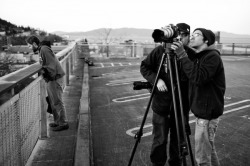Dear Sally,
I do not very well recall our conversation before my travels here but the four cups of coffee and artisan sandwiches consumed during our words exchanged may have been sufficient enough to regard the conversation as ‘memorable’—even though I despise the term. What I do recall from that morning (besides the circularity of each graduating high school class), was a comment you said, directed towards me in regards to my ‘blogging’ in Guatemala:
“Amongst everything Sean, tell us the truth—I want to hear what you’re feeling”
As hard as I try, I cannot capture the ‘truth’ of the Pena Blanca community through any type of word or image, but I can admit now (after 5 weeks spent here), that my dreams of late are no longer filled with food, but rather the struggles beyond that of my own—the stories of the families in comparison, make our rice and beans seem like luxury. How can I complain about the amount I’m eating, when my neighbors have less than half the amount for twice as many people? By becoming so close to this community all I want is to help them in some immediate way—I want to give them $20 cause it could do so much here...but no—what is tough is that this is not a sustainable solution for them yet my conscious wants the problem to change immediately. How can I leave here without giving something back to these people who are struggling now? One family wants to take a microfinance loan but cant...cause they're so poor, no one wants to be in a group with them. Where do they start? How can I simply return home with these problems, left unsolved, in my head? The problems of disparity of wealth and opportunity is something we must all deal with at times (I realize this) but nevertheless it’s very difficult knowing that I can return to living as I was before. What can I do at home that will not just give empty cash to families here and instead offer them something that will support their goals, opportunities and own self-empowerment? Because of this, I must remind myself that indeed giving money and clothes will help them now, but it is not the solution to combat poverty. Instead, I hope the stories and crafting of a documentary will impact others, myself included, to take actions, whether they be big or small, often or infrequent, to help others, where help is deserved.
As for my struggles, do not worry; my thoughts of hunger or tiredness are nothing in comparison to the families here and their children. In regards to ‘truth’, I have done my best to recite honestly, the complicated structure of schematics in the disparity of wealth and the struggles of one’s musings. Even though tomorrow is a new and the next is as well, my struggle today, lies in imagining our departure from here: At first it was so heavily colored with food and celebration upon succeeding off ‘living on a dollar’, but now the picture seems too complicated, un-colorable for the lines fall off the page. I don’t let this disappoint me though—there are still deep impressions of ink and color beginning to bleed through. Oh, if only I could color the entire page, connect the lines of indifference and un-complementary colors, only then maybe will a solution to the drawing be uncovered. For now, I hope the fibers on the page remain engraved so, a moment; no matter how far or whenever it presents itself, retains some coloring of this encounter to mine.
I do hope we can sit over coffee again and discuss our adventures in greater detail.
-Sean
p.s. Give Charlie my best and relay the message that his backpack (though now slightly more beaten) remains intact.
I do not very well recall our conversation before my travels here but the four cups of coffee and artisan sandwiches consumed during our words exchanged may have been sufficient enough to regard the conversation as ‘memorable’—even though I despise the term. What I do recall from that morning (besides the circularity of each graduating high school class), was a comment you said, directed towards me in regards to my ‘blogging’ in Guatemala:
“Amongst everything Sean, tell us the truth—I want to hear what you’re feeling”
As hard as I try, I cannot capture the ‘truth’ of the Pena Blanca community through any type of word or image, but I can admit now (after 5 weeks spent here), that my dreams of late are no longer filled with food, but rather the struggles beyond that of my own—the stories of the families in comparison, make our rice and beans seem like luxury. How can I complain about the amount I’m eating, when my neighbors have less than half the amount for twice as many people? By becoming so close to this community all I want is to help them in some immediate way—I want to give them $20 cause it could do so much here...but no—what is tough is that this is not a sustainable solution for them yet my conscious wants the problem to change immediately. How can I leave here without giving something back to these people who are struggling now? One family wants to take a microfinance loan but cant...cause they're so poor, no one wants to be in a group with them. Where do they start? How can I simply return home with these problems, left unsolved, in my head? The problems of disparity of wealth and opportunity is something we must all deal with at times (I realize this) but nevertheless it’s very difficult knowing that I can return to living as I was before. What can I do at home that will not just give empty cash to families here and instead offer them something that will support their goals, opportunities and own self-empowerment? Because of this, I must remind myself that indeed giving money and clothes will help them now, but it is not the solution to combat poverty. Instead, I hope the stories and crafting of a documentary will impact others, myself included, to take actions, whether they be big or small, often or infrequent, to help others, where help is deserved.
As for my struggles, do not worry; my thoughts of hunger or tiredness are nothing in comparison to the families here and their children. In regards to ‘truth’, I have done my best to recite honestly, the complicated structure of schematics in the disparity of wealth and the struggles of one’s musings. Even though tomorrow is a new and the next is as well, my struggle today, lies in imagining our departure from here: At first it was so heavily colored with food and celebration upon succeeding off ‘living on a dollar’, but now the picture seems too complicated, un-colorable for the lines fall off the page. I don’t let this disappoint me though—there are still deep impressions of ink and color beginning to bleed through. Oh, if only I could color the entire page, connect the lines of indifference and un-complementary colors, only then maybe will a solution to the drawing be uncovered. For now, I hope the fibers on the page remain engraved so, a moment; no matter how far or whenever it presents itself, retains some coloring of this encounter to mine.
I do hope we can sit over coffee again and discuss our adventures in greater detail.
-Sean
p.s. Give Charlie my best and relay the message that his backpack (though now slightly more beaten) remains intact.
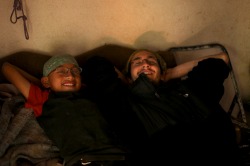
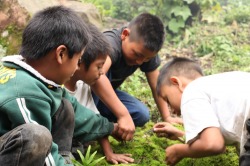
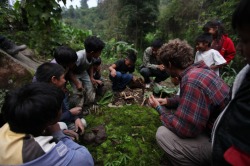
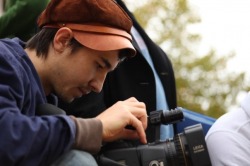
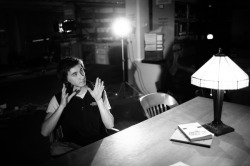
 RSS Feed
RSS Feed
